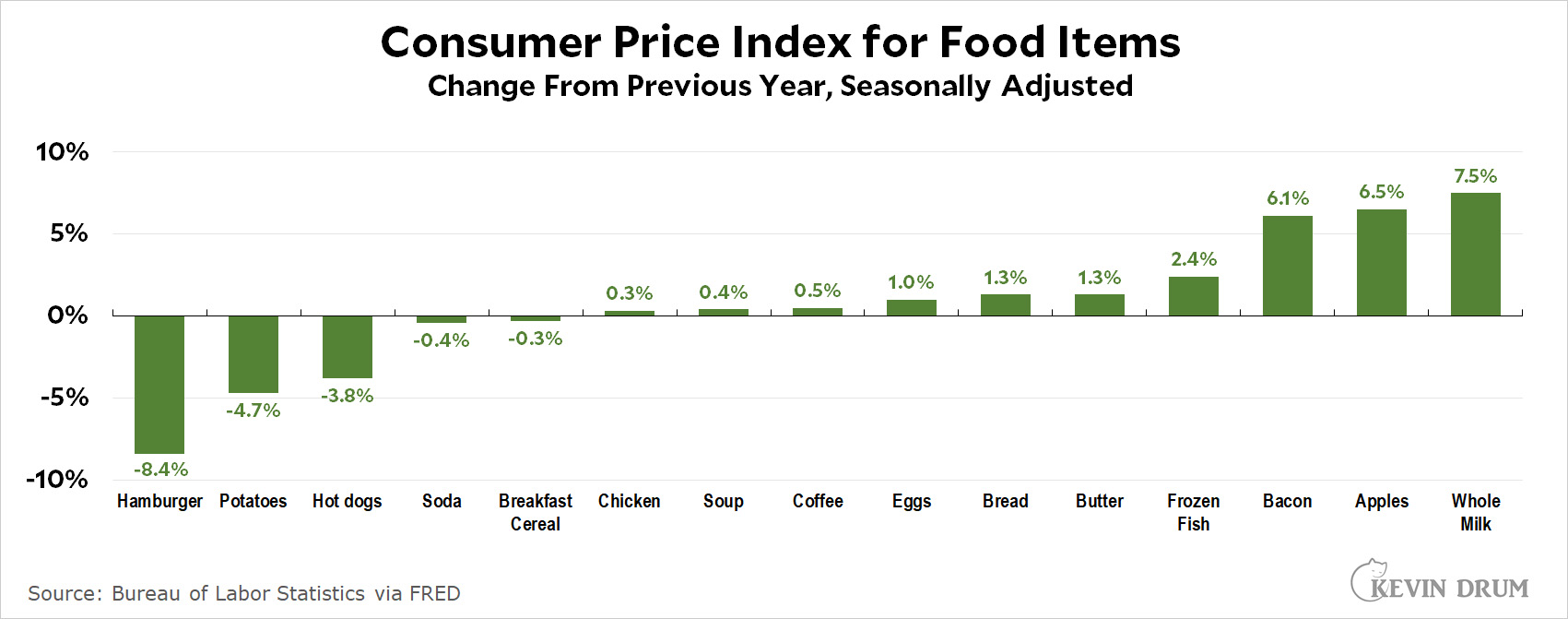As long as we're having fun with inflation today—and we are, aren't we?—let's take a dive into everyone's favorite category, the weekly trip to the supermarket. Here's the inflation rate for a random selection of food items:

This shows you how the game is played. If you want to run a scare story about people having seizures over the high price of food, just run some B-roll of a cash register ringing up the items on the right. Bacon is up 6.1%! Apples are up 6.5%! And whole milk is up a wallet-busting 7.5%!
Naturally you have to ignore the fact that hamburger is down 8.4%, hot dogs are down 3.8%, and bread is up only 1.3%. That would ruin the narrative, after all.
Anyway, when you add it all up, food in supermarkets is up 0.9% from last year. That's not busting anyone's wallet unless they eat bacon and apples for every meal.

The cost of airline food* is worst of all. Inflation for a meal at 30,000 feet over Kansas is literally soaring!
* Including cost of airfare.
So milk is up 7%. A gallon of (non-organic) milk runs about $3.50 in most of the country these days, so you're paying something like an extra quarter per gallon. I suppose if you're some kind of food manufacturer, say of yogurt or ice cream, and you're purchasing thousands of gallons a week, that's probably going to ding your bottom line a bit. For the average consumer buying 1-2 gallons a week for the family, there's not much there to freak out about.
Not 3.50 here. More like 2-2.5$
Kevin is right that the media's obsession with inflation is not really justified, but then his attempts to cherry-pick numbers to "prove" that inflation is not actually high are also silly. The actual "true" current inflation is the month/month number:
https://fred.stlouisfed.org/graph/?g=Fn1V
which for June was 10.9% at an annual. The fact is that inflation has really been high since the beginning of 2021. The question is whether this rate will continue and that has to be done by careful analysis of what is causing the rates. As experts such as Krugman (see his twitter feed) and Dean Baker point out, this rise is due mainly to supply bottlenecks, which should soon be solved, but whether there will be labor shortage that could cause inflation in the future is not really known, nor whether there will be further major government expenditures (don't bet on it - Democrats don't have the votes).
You mean based on lazily created numbers
If milk is up and hamburger down, then we're killing too many cows.
Western drought. Farmers have to kill off (some of) their herds. Grazing lands are dry, and feed crops need water too.
The bottle neck has been butchering the cattle. Slaughter houses have been paying low prices to farmers for a while--if the farmer can find someone able to take on more cattle. Some of them had so slow production due to covid, so less capacity.
NYT has beef prices rising as cattle prices fall. But wouldn't surprise me if some beef prices are falling now since comparison to a year ago would be when most things were closing down and supply chain was in disarray.
The sky cries PETA...
I guess ol' Kev is smarter than the leading CEOs. Or more likely, Kev is one more arrogant, stupid "progressive" who lies for a living. LOL
https://www.axios.com/ceos-warn-inflation-alarm-sound-da5e2dcf-af16-4ca4-a1de-bdd03fbbe775.html